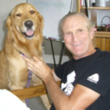Dog Is Love: Why and How Your Dog Loves You
(Libby/OverDrive eAudiobook)
Available Platforms
Description
More Details
Similar Titles From NoveList
Similar Authors From NoveList
Published Reviews
Booklist Review
Do dogs love us? Or are they just beholden to us for food and shelter? Any dog lover will stand by the former assertion, but animal behaviorist Wynne wanted definitive answers. His quest led him to read all available research, visit wolf centers, and conduct his own experiments. The studies are interesting, particularly those in which dogs' brains are studied when given a choice between human interaction (with praise) or food rewards. Overwhelmingly, dogs prefer human interaction, and based on MRIs, they are making these choices in the same part of the brain where they choose edible treats. Wynne's investigations further showed that hormones and a dog's genetic code also play large roles in their desire for human contact. His relentless search for answers leads him to conclude what all dog lovers know: Dogs desire to form close connections, to have warm personal relationships. How wolves became interested in humans is still largely conjecture, but that may be the subject of a future book. For any scientifically inclined dog lover, this will be a fascinating read.--Joan Curbow Copyright 2019 Booklist
Publisher's Weekly Review
Wynne, an Arizona State University psychology professor and founding director of the school's Canine Science Collaboratory, argues that "dogs' love is the cornerstone of the dog-human relationship" in his entertaining first book. He challenges previous theories positing that dogs enjoyed their "special relationship with humans" thanks to a "unique form of intelligence" allowing them to understand human "communicative intentions." In one experiment, Wynne and his colleagues found evidence that wolves raised by humans can manifest this same trait, conveying to him that the dog-human bond rests on a different foundation. In another experiments, they led a dog into a room to find its owner in one spot and a bowl of food in another; the result suggested that "most dogs prefer to be with their person [to being] fed." Wynne also recounts the research of others, including fMRIs of dog brain activity during interactions with owners. The book only falters with Wynne's overly ambitious assertion that emotions as humans know them translate directly into canines' lived experience. But dog lovers will be fascinated and the takeaway message that "we can do better for our dogs," by keeping in mind that dogs feel a meaningful emotional connection to their human owners and thus should be treated respectfully and considerately, is solidly supported. (Sept.) © Copyright PWxyz, LLC. All rights reserved.
Library Journal Review
This entry in the growing category of books examining the human-dog relationship is solidly supported by current research coming out of the Canine Science Collaboratory at Arizona State University. Canine behaviorist Wynne draws not only on studies conducted in his laboratory, but includes research from other scientists and institutions as evidenced in 13 pages of notes and references. Following a brief reminiscence about his exposure to pets as a child, the author dives into his thesis: What if dogs don't have cognitive abilities that enable them to understand humans (the longstanding opinion), but instead have some ability that hasn't been defined yet? Wynne believes that anthropomorphizing our animals is permissible and proper, and that ignoring our dogs' need for love is as unethical as mistreating them in other ways. The bond of love between dog and owner is strikingly similar to that found between couples. VERDICT After reading this book, readers may not perceive their relationship with their dog in the same way. Engagingly written and understandable by general audiences, this is a worthy addition to any pet lover's library. [See Prepub Alert, 3/4/19.]--Edell Marie Schaefer, Brookfield P.L., WI
Kirkus Book Review
The founding director at the Canine Science Collaboratory at Arizona State University probes the bonds of affection between humans and dogs.For 15,000 years, humans and dogs have been living side by side. However, as Wynne makes clear in this pleasingly garrulous and jocular report from the front lines of canine research, we are only beginning to understand how our minds have intertwined over that duration. "Dogs have an exaggerated, ebullient, perhaps even excessive capacity to form affectionate relationships with members of other species," writes the author. "This capacity is so great that, if we saw it in one of our own kind, we would consider it quite strangepathological, even. In my scientific writing, where I am obliged to use technical language, I call this abnormal behavior hypersociability. But as a dog lover who cares deeply about animals and their welfare, I see absolutely no reason we shouldn't just call it love." This may seem imprecise, and borders on anthropomorphism, but Wynne has found that evidence coming from labsevidence in the forms of genes that code for loving behavior, brain states that register and direct affection, and hormones that match the activity found in our own species when we feel loveand animal sanctuaries suggests that dogs feel affection much the way that humans do. This love doesn't require special cognitive abilities. It is innate in the creatures and then is shaped by the environment to be expressed, hopefully, as a warm bondthough if the dog is ill-treated, it will manifest in antisocial behavior. Of particular importance to Wynne is what this means in terms of how we interact and care for dogs. It is our responsibility to treat them with respect because they deserve it, and both of us will be greater creatures for it. A good mix of science and emotion, recommended for dog lovers everywhere. Copyright Kirkus Reviews, used with permission.
Booklist Reviews
Do dogs love us? Or are they just beholden to us for food and shelter? Any dog lover will stand by the former assertion, but animal behaviorist Wynne wanted definitive answers. His quest led him to read all available research, visit wolf centers, and conduct his own experiments. The studies are interesting, particularly those in which dogs' brains are studied when given a choice between human interaction (with praise) or food rewards. Overwhelmingly, dogs prefer human interaction, and based on MRIs, they are making these choices in the same part of the brain where they choose edible treats. Wynne's investigations further showed that hormones and a dog's genetic code also play large roles in their desire for human contact. His relentless search for answers leads him to conclude what all dog lovers know: "Dogs desire to form close connections, to have warm personal relationships." How wolves became interested in humans is still largely conjecture, but that may be the subject of a future book. For any scientifically inclined dog lover, this will be a fascinating read. Copyright 2019 Booklist Reviews.
Library Journal Reviews
This entry in the growing category of books examining the human-dog relationship is solidly supported by current research coming out of the Canine Science Collaboratory at Arizona State University. Canine behaviorist Wynne draws not only on studies conducted in his laboratory, but includes research from other scientists and institutions as evidenced in 13 pages of notes and references. Following a brief reminiscence about his exposure to pets as a child, the author dives into his thesis: What if dogs don't have cognitive abilities that enable them to understand humans (the longstanding opinion), but instead have some ability that hasn't been defined yet? Wynne believes that anthropomorphizing our animals is permissible and proper, and that ignoring our dogs' need for love is as unethical as mistreating them in other ways. The bond of love between dog and owner is strikingly similar to that found between couples. VERDICT After reading this book, readers may not perceive their relationship with their dog in the same way. Engagingly written and understandable by general audiences, this is a worthy addition to any pet lover's library. [See Prepub Alert, 3/4/19.]—Edell Marie Schaefer, Brookfield P.L., WI
Copyright 2019 Library Journal.Publishers Weekly Reviews
Wynne, an Arizona State University psychology professor and founding director of the school's Canine Science Collaboratory, argues that "dogs' love is the cornerstone of the dog-human relationship" in his entertaining first book. He challenges previous theories positing that dogs enjoyed their "special relationship with humans" thanks to a "unique form of intelligence" allowing them to understand human "communicative intentions." In one experiment, Wynne and his colleagues found evidence that wolves raised by humans can manifest this same trait, conveying to him that the dog-human bond rests on a different foundation. In another experiments, they led a dog into a room to find its owner in one spot and a bowl of food in another; the result suggested that "most dogs prefer to be with their person fed." Wynne also recounts the research of others, including fMRIs of dog brain activity during interactions with owners. The book only falters with Wynne's overly ambitious assertion that emotions as humans know them translate directly into canines' lived experience. But dog lovers will be fascinated and the takeaway message that "we can do better for our dogs," by keeping in mind that dogs feel a meaningful emotional connection to their human owners and thus should be treated respectfully and considerately, is solidly supported. (Sept.)
Copyright 2019 Publishers Weekly.Reviews from GoodReads
Citations
Wynne, C. D. L., & Langton, J. (2019). Dog Is Love: Why and How Your Dog Loves You (Unabridged). HarperAudio.
Chicago / Turabian - Author Date Citation, 17th Edition (style guide)Wynne, Clive D. L and James Langton. 2019. Dog Is Love: Why and How Your Dog Loves You. HarperAudio.
Chicago / Turabian - Humanities (Notes and Bibliography) Citation, 17th Edition (style guide)Wynne, Clive D. L and James Langton. Dog Is Love: Why and How Your Dog Loves You HarperAudio, 2019.
Harvard Citation (style guide)Wynne, C. D. L. and Langton, J. (2019). Dog is love: why and how your dog loves you. Unabridged HarperAudio.
MLA Citation, 9th Edition (style guide)Wynne, Clive D. L., and James Langton. Dog Is Love: Why and How Your Dog Loves You Unabridged, HarperAudio, 2019.
Copy Details
| Collection | Owned | Available | Number of Holds |
|---|---|---|---|
| Libby | 1 | 1 | 0 |
































